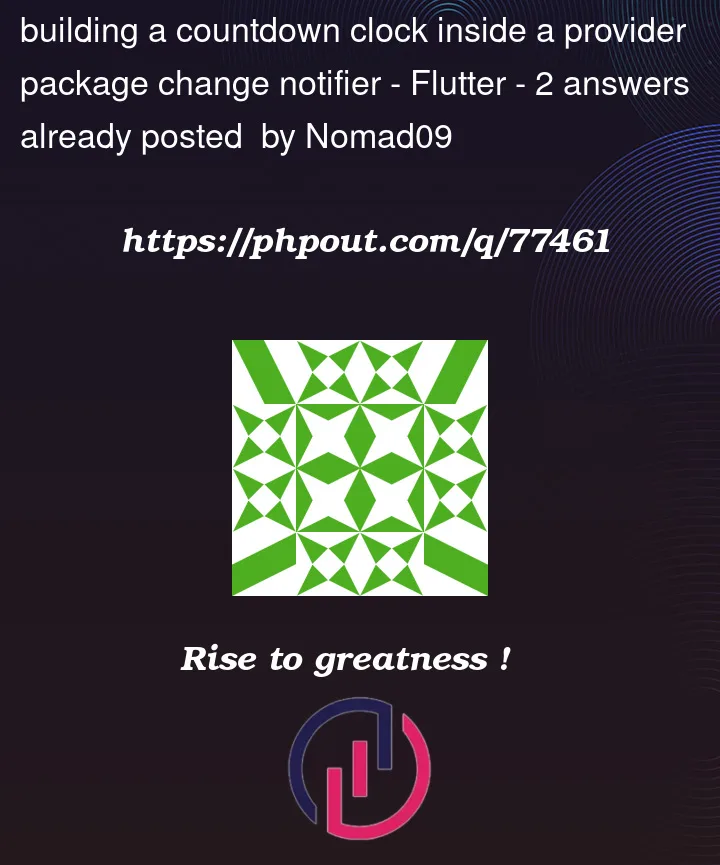I have built a working countdown clock that displays the time remaining in the format, hours:minutes:senconds. inside a stateful widget. that uses a fullscreen inkwell to start and stop it.
What I want to do is transfer this code to a change notifier. (I already a change notifier setup ready to go called CountdownTimers) so i can see this countdown running from multiple pages on my app.
Here is the code for the working countdown clock in the stateful widget:
class ChessClock2 extends StatefulWidget {
const ChessClock2({Key? key}) : super(key: key);
@override
State<ChessClock2> createState() => _ChessClock2State();
}
class _ChessClock2State extends State<ChessClock2> {
static const countdownDuration = Duration(hours: 5, minutes: 10, seconds: 10);
Duration duration = Duration();
Timer? timer;
bool beenPressed = false;
@override
void initState() {
super.initState();
Reset();
}
void Reset() {
setState(() => duration = countdownDuration);
}
void AddTime() {
final minusSeconds = -1;
setState(() {
final seconds = duration.inSeconds + minusSeconds;
if (seconds < 0) {
timer?.cancel();
} else {
duration = Duration(seconds: seconds);
}
});
}
void StartTimer() {
timer = Timer.periodic(
Duration(seconds: 1),
(_) => AddTime(),
);
}
void StopTimer() {
setState(() => timer?.cancel());
}
@override
Widget build(BuildContext context) {
return SafeArea(
child: Scaffold(
body: InkWell(
onTap: () {
setState(() {
beenPressed = !beenPressed;
});
beenPressed ? StartTimer() : StopTimer();
},
child: Container(
width: double.infinity,
height: double.infinity,
decoration: BoxDecoration(
color: beenPressed ? kOrange : kBlueGrey900,
borderRadius: BorderRadius.circular(30),
),
child: Center(
child: TimeDisplay(),
),
),
),
),
);
}
Widget TimeDisplay() {
String twoDigits(int n) => n.toString().padLeft(2, '0');
final hours = twoDigits(
duration.inHours.remainder(60),
);
final minutes = twoDigits(
duration.inMinutes.remainder(60),
);
final seconds = twoDigits(
duration.inSeconds.remainder(60),
);
return Text(
'$hours:$minutes:$seconds',
style: TextStyle(fontSize: 50),
);
}
}
When I transfer the code over, I’m running into trouble because I can’t use setState in the change notifier and I’m unsure how to translate the code to get it to work.
so far, by moving the individual variables over as well as the widget TimDisplay, I’m able to get the timer to display correctly from the change notifier but am not sure how to get it to work from the change notifier.
here is where I am now:
type hereclass ChessClock3 extends StatefulWidget {
const ChessClock3({Key? key}) : super(key: key);
@override
State<ChessClock3> createState() => _ChessClock3State();
}
class _ChessClock3State extends State<ChessClock3> {
@override
void initState() {
super.initState();
Reset();
}
void Reset() {
setState(() => duration = countdownDuration);
}
void AddTime() {
final minusSeconds = -1;
setState(() {
final seconds = duration.inSeconds + minusSeconds;
if (seconds < 0) {
timer?.cancel();
} else {
duration = Duration(seconds: seconds);
}
});
}
void StartTimer() {
timer = Timer.periodic(
Duration(seconds: 1),
(_) => AddTime(),
);
}
void StopTimer() {
setState(() => timer?.cancel());
}
@override
Widget build(BuildContext context) {
return SafeArea(
child: Scaffold(
body: InkWell(
onTap: () {
setState(() {
context.read<CountdownTimers>().BeenPressed();
});
context.read<CountdownTimers>().beenPressed
? StartTimer()
: StopTimer();
},
child: Container(
width: double.infinity,
height: double.infinity,
decoration: BoxDecoration(
color: context.watch<CountdownTimers>().beenPressed
? kKillTeamOrange
: kBlueGrey900,
borderRadius: BorderRadius.circular(30),
),
child: Center(
child: context.read<CountdownTimers>().TimeDisplay(),
),
),
),
),
);
}
}
class CountdownTimers with ChangeNotifier {
Duration _countdownDuration = Duration(hours: 5, minutes: 10, seconds: 10);
Duration _duration = Duration();
Timer? timer;
bool _beenPressed = false;
Duration get countdownDuration => _countdownDuration;
Duration get duration => _duration;
bool get beenPressed => _beenPressed;
void BeenPressed() {
_beenPressed = !_beenPressed;
}
Widget TimeDisplay() {
String twoDigits(int n) => n.toString().padLeft(2, '0');
final hours = twoDigits(
_duration.inHours.remainder(60),
);
final minutes = twoDigits(
_duration.inMinutes.remainder(60),
);
final seconds = twoDigits(
_duration.inSeconds.remainder(60),
);
return Text(
'$hours:$minutes:$seconds',
style: TextStyle(fontSize: 50),
);
}
}
If anyone can show me how to translate the code over It would be very much appreciated.
thanks so much!




2
Answers
I would use Flutter Riverpod instead like the code below. In Riverpod it’s not recommended to use Change Notifier. Even in complexe application. To change the state of Change Notifier you must call notifyListeners.
Then in the widget
And finally, don’t hesitate to put your conversion logic Duration to String, into a extension
The trick you are looking for is the function
notifyListeners()of aChangeNotifier. If you usedcontext.watch()inside your widget to watch the ChangeNotifier, you will be updated and the widget is rebuild if necessary.A short example might look like this
ConsumingWidget.dart
In this case, you would need to provide an instance of
TimeProviderabove your main widget in the widget tree viaChangeNotifierProvider.You can then let the widget rebuild (if
.counterchanged) vianotifyListeners()ParentWidget.dart
Provider.dart
This is the built-in solution of the Provider package. Starting from this basic pattern, you can then look into more sophisticated state management solutions like Riverpod, Bloc etc.